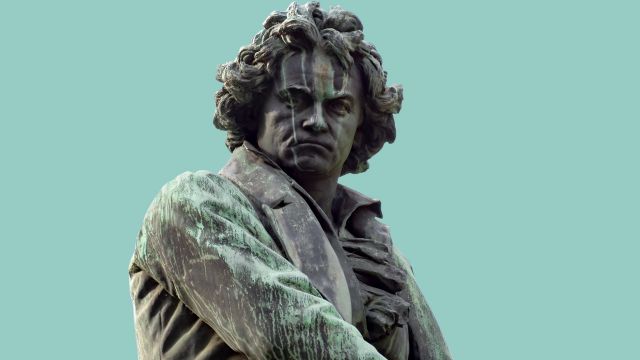The Sound of History
Before moving on to the review proper I would like to extend my best wishes to Brett Dean who co-created this concert. He is one of the most internationally performed composers of this generation and unfortunately tested positive for COVID-19 upon arriving in Australia from a performance in Taiwan and is in the Royal Adelaide Hospital.
His place was taken (at short notice) by Richard Mills AM, one of Australia’s most prolific and internationally recognised composers. The Sound of History was a diverse concert and to learn the music in a short space of time was no mean feat, one he appeared to manage seamlessly.
The concert focussed on Beethoven’s increasing deafness and how this affected his music. It also explored startling insights into the turning point of his life, October 6 1802, when he composed not a single piece of music but a letter that he kept secret until he died. The performance also featured music composed over this period of time.
Christopher Clark, Professor of Modern History at the University of Cambridge and a Fellow of St Catharine’s College lead us through the evening. His mini-lectures were illustrated on a giant screen behind the orchestra which also featured live vision of members of the orchestra, giving us an insight into the orchestra that we would not normally have.
The screen also featured Brett Dean himself, recorded from his room at the Royal Adelaide Hospital enabling him to thank Richard Mills and to wish his orchestra good luck.
The first half of the evening featured examples of Beethoven’s compositions completed around the time of the Heiligenstadt Testament(a letter and directive written by Beethoven to his brothers in October, 1802) and a modern musical reflection, Testament.
The Septet in E-flat major Op 20, Piano Concerto No.1 in C major Op 15, Symphony No.1 in C major Op 21 and Symphony No.2 in D major Op 36 demonstrate Beethoven’s playfulness, humour, majestic themes, sweeping passages, use of fermata, questioning and answering from different sections of the orchestra, urgency and amazing tutti sections. An interesting and clever selection.
Testament: Music for Orchestra written by Brett Dean in 2008 takes us inside Beethoven’s mind and is a musical reflection of how he may have heard the world as his deafness developed. It is widely believed that he suffered from tinnitus and an aversion to loud noise. Using bows without resin produces an eerie sound that partially obscures the main themes. An unusual method of playing of the wind section causes the theme to be strident. These two effects represent Beethoven’s hearing problems.
It was fascinating to watch the string section continually changing their bows from those with resin to those without. At times the themes were clear, at other times jumbled to imitate the frustration of not being able to hear voices clearly, particularly when Beethoven experienced times when the conditions seemed to subside.
The frenzied tutti section at the conclusion was memorable and is reminiscent of final sections of The Rite of Spring by Igor Stravinsky. There is a feeling of no escape as themes cross until the literally exhausting ending. A memorable composition.
The second half of the evening comprised the famous and, in some ways, infamous Symphony No.3 in E-flat major Op 55 or the Eroica. It has puzzled historians and musicians since written. Originally briefly dedicated to Napoleon Bonaparte, it is Beethoven’sfirst great symphony to have captured the romantic imagination.
Some experts claim the movements are in the wrong order, some would prefer the third movement to be removed and some believe it is too fragmented.
Whatever you believe, the Eroica is undeniably majestic and the presto section at the end of the symphony is exhilarating.
The Adelaide Symphony Orchestra performed superbly. Their precision, use of light and shade and cohesion was dazzling, especially working with a different conductor at such short notice!
The Sound of History (Beethoven, Napoleon and Revolution) was an educational, exciting, thoroughly entertaining concert honouring one of the giants of the classical repertoire.
Barry Hill
Subscribe to our E-Newsletter, buy our latest print edition or find a Performing Arts book at Book Nook.

